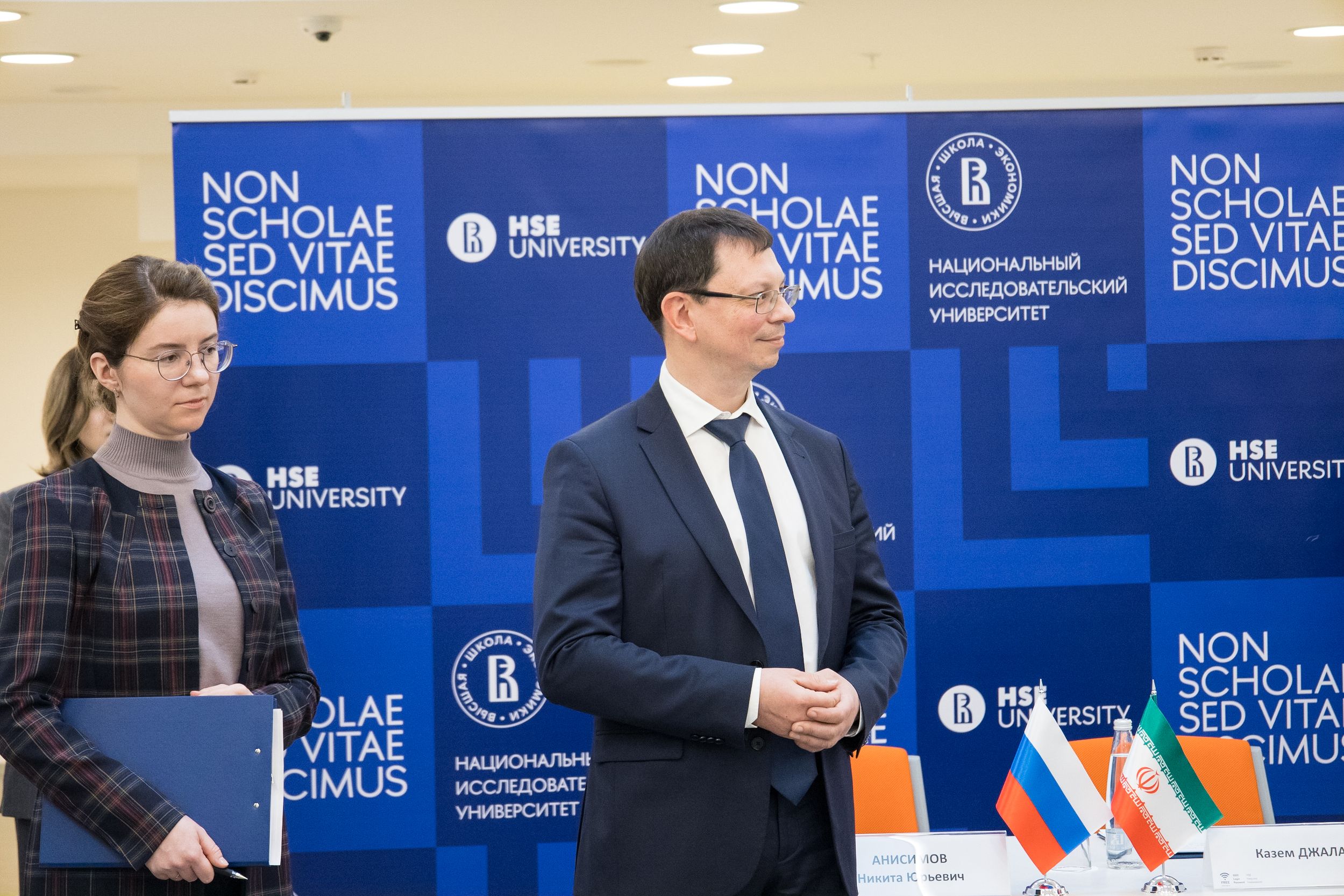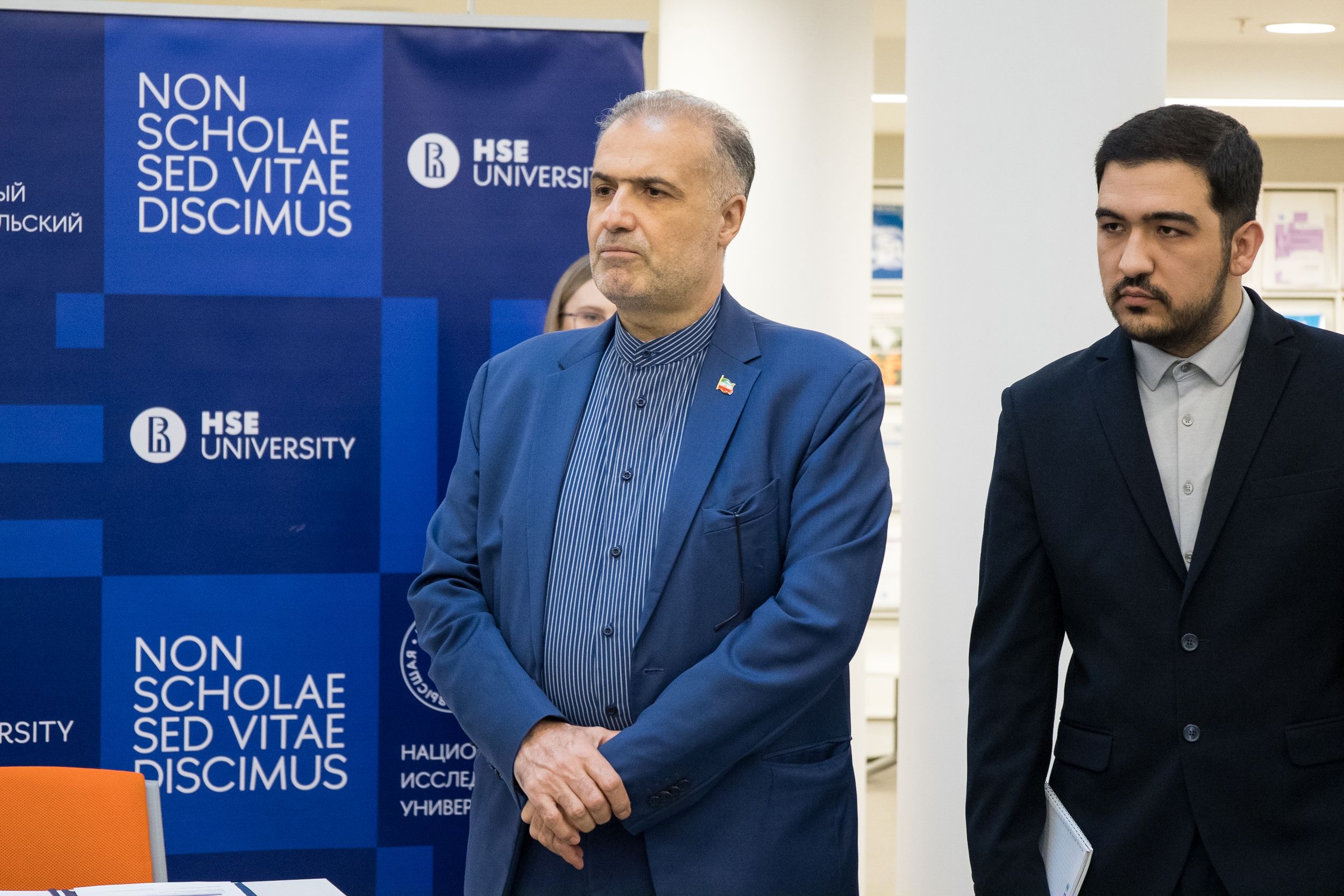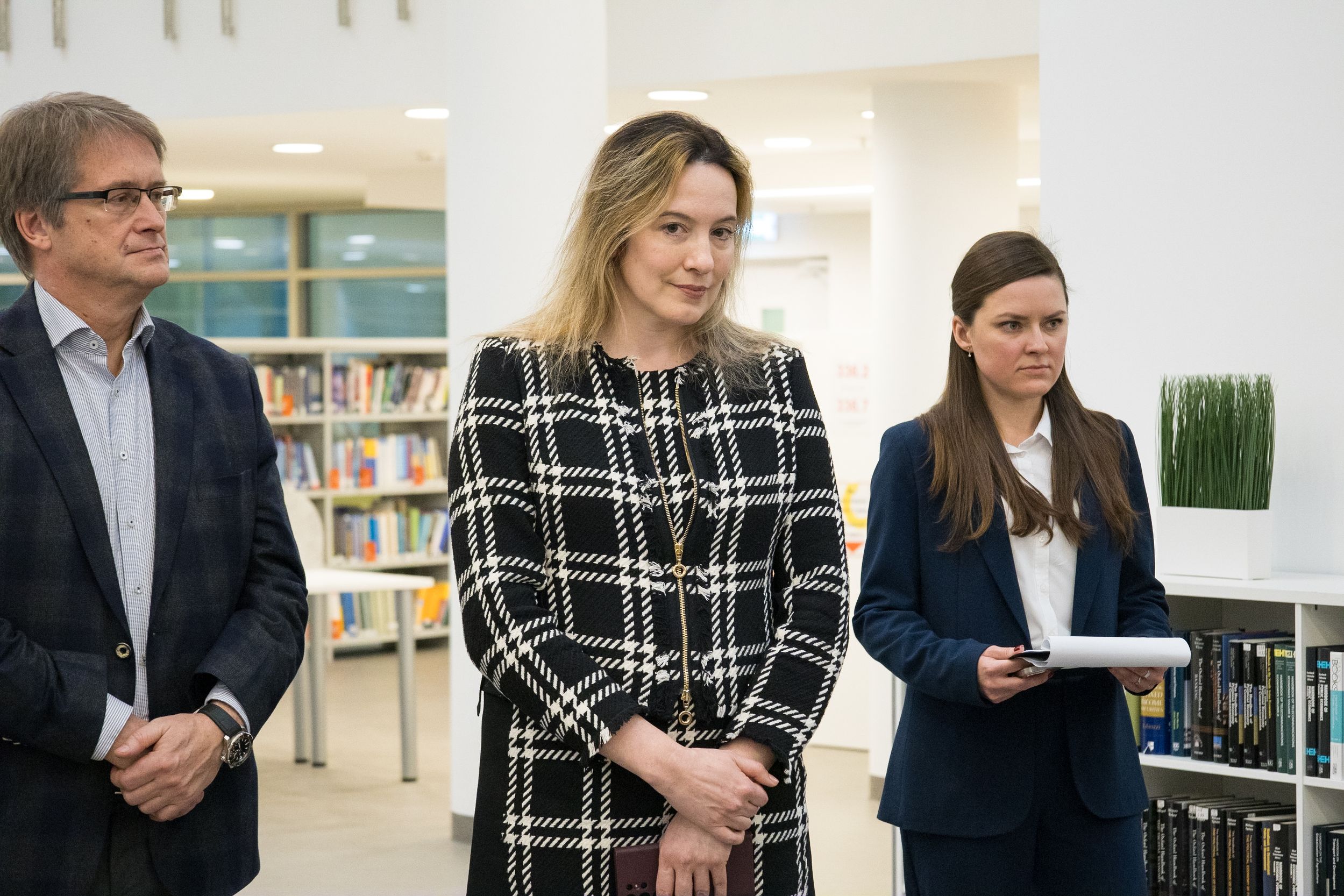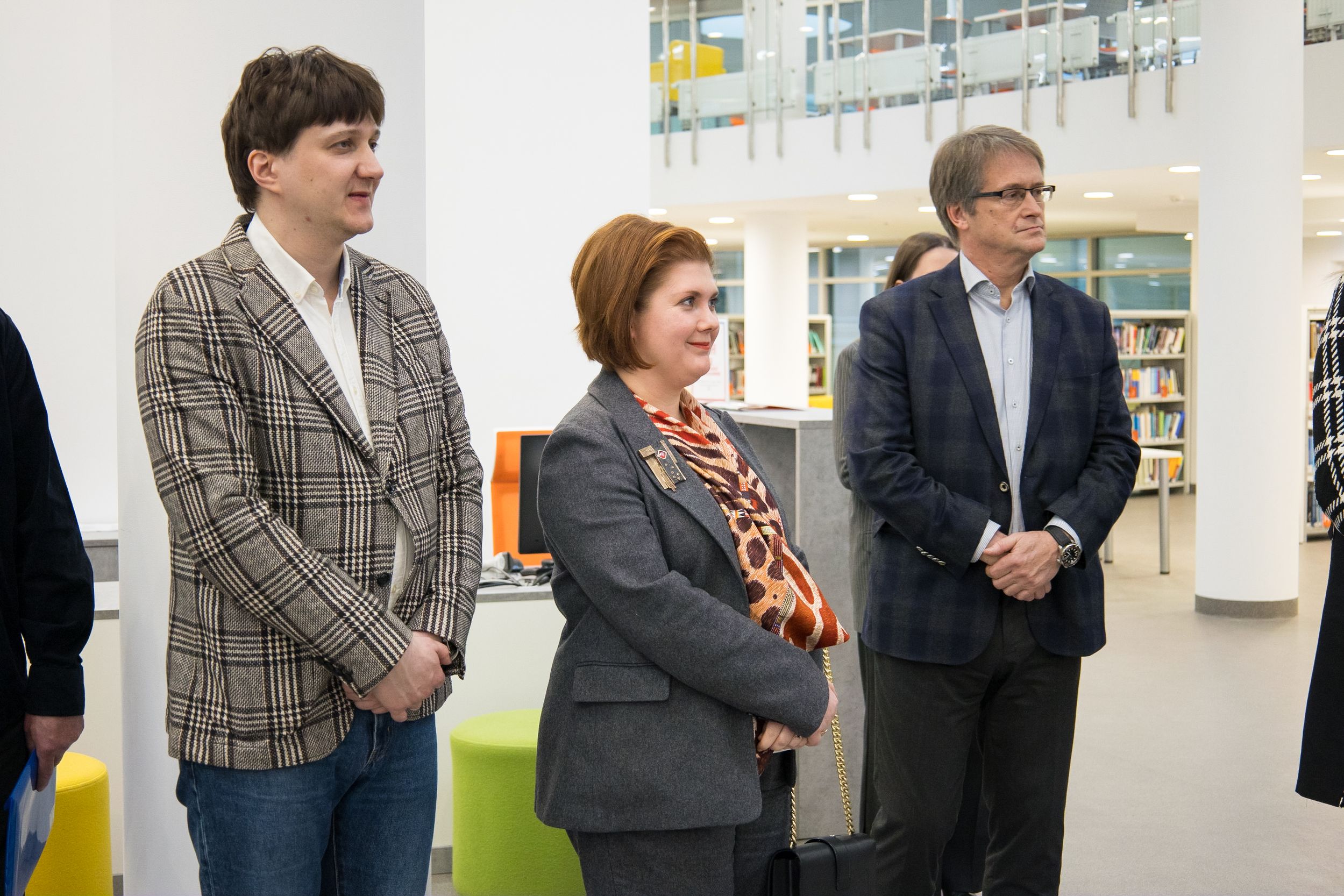‘There Are Many Directions in Which We Can Develop Our Relations with Iran’
On February 12, an official signing ceremony was held for an agreement on the free transfer of literature published by the Organisation for Researching and Composing University Textbooks in the Islamic Sciences and the Humanities under the Ministry of Science, Research and Technology of the Islamic Republic of Iran (SAMT) to HSE University. The event took place in the HSE University library on Pokrovsky Bulvar.
The meeting was attended by HSE University Rector Nikita Anisimov and Ambassador Extraordinary and Plenipotentiary of the Islamic Republic of Iran Kazem Jalali. HSE University Vice Rector Victoria Panova, First Vice Rector Vadim Radaev, Dean of the Faculty of World Economy and International Affairs Anastasia Likhacheva, Dean of the Faculty of Humanities Felix Azhimov, Director of the Institute for Oriental and Classical Studies (IOCS) Denis Volkov, Deputy Library Director Elena Shukshina, and other university representatives also took part in the event.
At the beginning of the ceremony, Nikita Anisimov and Kazem Jalali greeted each other and exchanged words of gratitude. ‘I am pleased to personally congratulate you on the anniversary of the victory of the Islamic Revolution in Iran,’ said HSE University Rector. ‘We recently celebrated Diplomat’s Day in Russia, and I also congratulate you, a diplomat who builds relations between our countries, on this date.’

Nikita Anisimov said that there are a number of students currently learning the Persian language at the university, and their number will only grow thanks to the literature provided. ‘We are confident that exchange programmes will also develop. We have previously met with the rectors of Iranian universities and agreed on cooperation,’ Nikita Anisimov said. ‘There are many directions in which we can develop our relations.’

Kazem Jalali shared that, in his opinion, HSE University was one of the leading Russian universities. He drew attention to the building renovations and noted that the Embassy of the Islamic Republic of Iran was located just a few metres away from the main building of HSE University. ‘We are neighbours and should visit each other more often, so we invite you and your colleagues to visit us and try Iranian cuisine,’ he said. ‘We will continue scientific and public relations with your help. We are also pleased to know that Iranian students study at the university and that Persian is taught here.’

Vice Rector Victoria Panova added that the initiative by the Embassy of the Islamic Republic of Iran in the Russian Federation to donate literature would contribute to the development and support of Iranian studies at HSE University. ‘Iranian studies at the university are developed at the Institute for Oriental and Classical Studies (IOCS) within the Faculty of Humanities and the Faculty of World Economy and International Affairs. Scientific and educational literature and manuals can be useful for training specialists in Iranian studies in senior undergraduate and graduate courses, as well as for teachers and researchers at HSE University,’ said the Vice Rector.

Continuing the topic, Anastasia Likhacheva, Dean of the Faculty of World Economy and International Affairs, said that students and staff of the faculty started taking an increased interest in Iran when the former Ambassador Extraordinary and Plenipotentiary of Iran to Russia, Mehdi Sanai, began teaching at HSE University. ‘And we are proud to say that he continues to do it to this day,’ she emphasised.
Felix Azhimov also greeted the delegation from the Embassy of the Islamic Republic of Iran. ‘The books in Iranian studies and Iranian languages that you are granting us will be in great demand among our students who learn the Persian language,’ he believes.
At the end of the meeting, Nikita Anisimov and Kazem Jalali exchanged souvenirs and made a short tour of the library.
The Organisation for Researching and Composing University Textbooks in the Islamic Sciences and the Humanities (SAMT) is a government organisation operating under the auspices of Iran’s Ministry of Science, Research and Technology. SAMT was founded by the Supreme Council of the Cultural Revolution in 1985, after the Cultural Revolution in Iran, and is the largest organisation dedicated to the development, preparation, and publication of textbooks for higher education in Iran in the field of humanities. Its publications include textbooks on Persian as a foreign language for all levels of education, manuals on translating texts on various subjects, including news and business, manuals on written speech development, educational and scientific literature, and manuals for universities on various subjects. Russia’s Institute of Asian and African Studies at Moscow State University and the Institute of Oriental Studies of the Russian Academy of Sciences are among the foreign partners of SAMT.
See also:
Scientific and Educational Partnership of HSE University and Iran Is Gaining Momentum
A delegation from Mofid University has visited HSE University. Representatives of the Iranian university expressed interest in cooperation with HSE in the framework of research projects and educational programmes in the field of economics, legal aspects of the Islamic system of finance and other areas. The parties also discussed the opportunities for launching a joint academic mobility programme.
‘We Would Be Happy to See More Iranian Students at Our University’
HSE University has hosted the signing of cooperation agreements with two Iranian universities—Allameh Tabataba’i University (ATU) and the University of Isfahan (UI). Delegations from the universities led by ATU President Abdollah Motamedi and UI President Hossein Harsij visited HSE University and met with Rector Nikita Anisimov and staff of the HSE International Office led by Vice Rector Victoria Panova.
‘Working in Academia Is My Lifelong Desire’
Majid Sohrabi is a 28 year-old student from Iran currently enrolled in a doctoral programme at the HSE University Faculty of Computer Science. Before starting his PhD, he graduated with honours from the university’s Master of Data Science programme. In addition to studying, he also works as an assistant at the School of Data Analysis and Artificial Intelligence and a research assistant at the Laboratory for Models and Methods of Computational Pragmatics.
‘Professionals Who Have Studied Outside Their Home Countries Should Shape New Narratives’
Studies in lockdown, the fun of Russian classes, and the hardships of learning microeconomics: the HSE News Service talked to three international students of economics who are getting their master’s degrees from HSE University this year.
‘I Like the Balance between Practice and Theory’
Masoud Ebadi from Tehran, Iran is currently pursuing a Master’s in Strategic Corporate Finance (SCF) at HSE University Moscow (Faculty of Economic Sciences). In this interview, he talks about his experience of the admissions process, the advantages of master’s studies at HSE, and what he loves about Moscow—including food recommendations for new arrivals.
‘Today Is a Wonderful Day, Because I Hear Persian Being Spoken’
The Institute for Oriental and Classical Studies of the Faculty of Humanities has launched a Center of Iranian Studies and the Persian Language. On December 6, representatives of HSE University and the Cultural Representative of the Embassy of the Islamic Republic of Iran in Moscow signed the cooperation agreement.
HSE Students on Iran Trip: 'It Was Like Flying to the Moon!'
During the annual road expedition 'Cultural Effects of Borders', culture studies students from HSE visited Georgia, Armenia, and – for the first time – Iran. They talked to HSE News about the tastes and colors of Iran, and about how compliments form the foundation of the country's communications culture.


